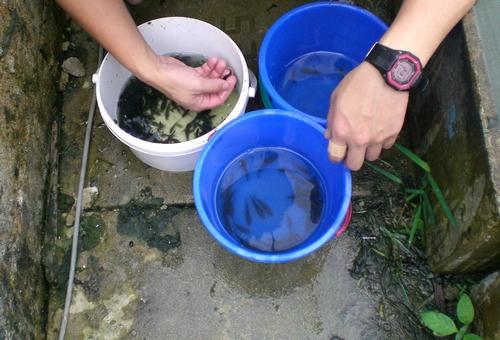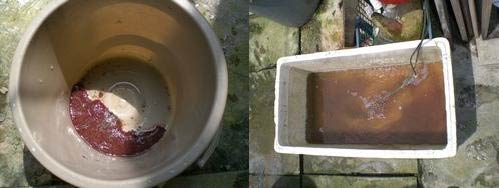
Home of the warrior class
By Redhillbetta:
Chris is one-part player and one-part breeder, who operates a small breeding facility of about 30 ponds with some friends in Jalan Kayu. He is passionate about his bettas, having to feed them, care for them, work them out and train them to fight, all these in a part time basis while holding a regular job. This web page provides a glimpse of his farm and his efforts to not just propagate the fighting strains but more importantly to make improvements on the breed.
|
|
Chris's bettas are raised in these concrete tanks, over 20 such tanks were built. |
|
A section of his concrete tanks, fully stocked with fish. One tank will house a hundred over fishes. |
|
Several smaller concrete tanks like these are used to hold adult fighters and his female stocks. |
|
Storage pond to provide his water need, good and clean water is vital in raising healthy fish. Fresh water supplied from the utility companies are not suitable as they contains high doses of chlorine and chloramines which is detrimental to the well being of the fish. |
|
Newly harvested fish are first conditioned in these blue containers. The conditioning period is called "saba" in local jargon, which is to rest the fish and feed them with less food for several days. The fishes will lose some fat in the process and are well rested before undergoing a training regime to become an elite fighter. |
|
A pond of 2 month old juveniles. |
|
Sorting the stronger male fighters for further grow out, the rest of the males and majority of the females are discarded. |
|
Local breeders each has their own secret ways of increasing mineral contents and micro organism production in their ponds and tanks, as water rich in minerals and nutrients are essential in raising strong and tough fighters. |
|
Transparent bottles with fighters, the 2 covered white pails hold the breeding fish. Knowing that breeding champions with champions don't always produce champions, but is the foundation of ongoing successful generations, Chris actively source fighters from the region and using them for breeding after they had proven their worth in the arenas. |
|
More then 50% of farm expenses goes into feeding bettas. The bettas are fed live cultured food, like tubifex worms and daphnias(AngBoon). Cultured live foods are expensive, this is partly due to transportation costs, since they cannot be bought in bulk and stored. Brokers purchase live foods (from Malaysia) and pack them in plastic bags filled with oxygen and make daily deliveries to the farms. Occasional treats, like frozen bloodworms and guppy fry provides variation and supplement their normal diet. |
|
Some specimens bought from the farm, yet to unpack from the plastic bags. |
|
email: redhillbetta@yahoo.com.sg |

